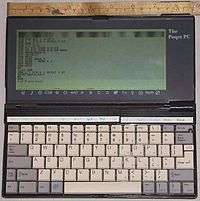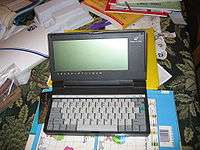Poqet PC

The Poqet PC is a very small, portable IBM PC compatible computer, introduced in 1989 by Poqet Computer Corporation with a price of $2000. The computer was discontinued after Fujitsu Ltd. bought Poqet Computer Corp. It was the first subnotebook form factor IBM PC compatible computer that ran MS-DOS. The Poqet PC is powered by two AA-size batteries. Through the use of aggressive power management, which includes stopping the CPU between keystrokes, the batteries are able to power the computer for anywhere between a couple of weeks and a couple of months, depending on usage. The computer also uses an "instant on" feature, such that after powering it down, it can be used again immediately without having to go through a full booting sequence. The Poqet PC is comparable to the HP 95LX/HP 100LX/HP 200LX and the Atari Portfolio handheld computers.
Poqet PC, "Classic" and Prime
Three variants were produced. The Poqet PC was the first to be introduced and the Poqet PC Prime followed shortly after. (The original version was subsequently renamed the Poqet PC "Classic"). Several years later, the Poqet PC Plus was introduced. The main difference between the Poqet PC Classic and the Prime was the expansion of RAM from 512 to 640 KB and enhancement of the power management features.
Specifications
- Size: 8.8 in (220 mm) x 4.3 in (110 mm) x 1 in (25 mm)
- Weight: 1.2 lb (0.54 kg) with batteries
- Battery life: 50–100 hours (expect a lot less if running long, CPU-intensive programs (10-20 h approx.))
- Microprocessor: 80C88 / 7 MHz
- Memory: 640 KB SRAM
- Display: Reflective DSTN (no backlight)
- Display compatibility: MDA: 80 × 25 characters
CGA: 640 × 200 pixels - PCMCIA: 2 × Type I, Revision 1.0 memory card slots
- Secondary storage: Drive A: 512 KB-2 MB PCMCIA (not included)
Drive B: 512-2 MB PCMCIA (not included)
Drive C: 768 KB ROM drive with MS-DOS 3.3 and PoqetTools
Drive D: 22 KB volatile RAM drive - Built-in software: MS-DOS 3.3, PoqetLink, and PoqetTools
Poqet PC Plus

Several years after the Poqet Prime and Classic, and some time after Fujitsu purchased Poqet Computer Corp., the new and improved Poqet PC Plus was introduced. The Poqet PC Plus had significant differences from the Classic and Prime models, some better than others. It features a rechargeable battery pack that holds a smaller charge than the "Classic", enhanced PC Card slots that now support more PC Cards, a transflective backlit LCD and 2 MB of RAM (640 KB to DOS, 64 KB shadow, and 1-1344 KB for a RAM disk). The Poqet "Classic"'s LCD didn't have a backlight and was more prone to breaking than the Poqet PC Plus. It also only took Type I, Release 1.0 SRAM cards, as opposed to Type II cards and Release 2.0 cards, including flash, SRAM, and a few modem cards. The Plus also had more memory. Despite many improvements, the Plus also had its drawbacks. The Poqet PC Plus was considerably larger and heavier than its predecessors. It weighed approximately 1.83 lb (0.83 kg) as opposed to the Classic's 1.2 lb (0.54 kg). It also has a very odd miniature 26-pin serial connector for which there is no currently available adapter. However, many Toshiba external floppy drives and dongles used this same JAE connector. An amateur radio hobbyist who uses a Poqet has found a way to make a suitable adapter.[1] It also is not totally PCMCIA Release 2.0 compatible, so not all memory cards will work, and, as Bryan Mason says on his Poqet site, only the "PNB Samantha modem, Megahertz 14.4 kbit/s modem with XJACK, and the AT&T Paradyne KeepInTouch 14.4 kbit/s modems" will work in it.[2] In addition, not all CompactFlash cards work in the Poqet. Users have found that many machines do not work with newer CF cards.
Specifications
- Size: 9.05 in (230 mm) x 5.12 in (130 mm) x 1.42 in (36 mm)
- Weight: 1.54 lb (0.70 kg) w/batteries
- Battery life: 3–12 hours (application dependent)
- Microprocessor: NEC V30 at 16 MHz
- Memory: 2 MB (Memory above 640 KB is configurable as EMS or a RAM disk. 64 KB is reserved for shadow BIOS.)
- Display: Transflective LCD with backlight on demand. 7.25 in (184 mm) diagonal size.
- Display compatibility: MDA: 80 x 25 characters
CGA: 640 x 200 pixels - Expansion: 2 × Type II PCMCIA slots (nearly compatible with PCMCIA Revision 2.0.)
1 × TTL serial port
1 × TTL/RS-232 serial port (configurable)- PCMCIA Compatibility: Supports SunDisk (SanDisk) ATA Flash, 3.3 V and 5 V SRAM; AT&T Paradyne KeepInTouch modem, Megahertz PCMCIA 14.4 kbit/s modem with XJACK, and PNB Samantha modem.
- Secondary storage: Drive A: Left PCMCIA slot
Drive B: Right PCMCIA slot
Drive C: ROM drive with MS-DOS 5.0
Drive D: 784 KB Flash drive
Drive E: RAM drive (if configured) - Built-in software: MS-DOS 5.0, EMS driver, RAM Disk driver, Flash utility, barcode reader, PenConnect serial communications software, PCMCIA driver.
Reception
The Poqet PC was one of the first subnotebooks to exist in the marketplace, and still today is one of the smallest, although it is beaten by the HP 200LX. It was immediately recognized as a milestone in portable computing when PC Magazine awarded the Poqet PC development team (Ian Cullimore, John Fairbanks, Leroy Harper, Shinpei Ichikawa, Stav Prodromou) its coveted Technical Excellence Award for 1989.[3] Interestingly, the same device that PC World called "one of the 50 greatest gadgets of the last 50 years"[4] had a very short lifespan, from only about 1989-1994. After Poqet was bought by Fujitsu, the Poqet was soon axed. For a short time Poqet value declined, with the onset of Windows CE. A similar decline in HP 200LX demand also occurred after the introduction of HP Windows CE machines. However, despite the new machines' power, their operating system soon proved to be inefficient. The Poqets and HP 'LX' DOS machines became very high in demand, and recently an HP 200LX sold for $182 on eBay. Poqets also are in fairly high demand, but fetch somewhat lower prices. A Cherry Hill, NJ business, Disks 'n' Data, once had a stock of Classics and Pluses. As the owner of the store, Jerry Tessler, put it: "I sold them all in twenty minutes." Unlike running Windows CE, running DOS in near-standard specifications meant that everything from Lotus 1-2-3 to Zork worked as expected.
See also
- Atari Portfolio
- Zeos Pocket PC
- HP 95LX
- HP 100LX
- HP 200LX
- HP 1000CX
- HP OmniGo 700LX
- Toshiba Libretto
- Fujitsu Lifebook
- Yukyung Viliv N5
- Subnotebook
- Netbook
- Palmtop PC
- Ultra-mobile PC (UMPC)
References
Sources
- California Digital. 2006. 2006-12-22.
- Mason, Bryan. The Poqet PC Home Page. 2006. 2006-12-25.
- Poqet PC Plus Serial Adapter. 2005. 2006-12-22.
- Wong, Al. Al's Review of Fujitsu's Poqet PC Plus. 2001. 2006-12-23.
Citations
- ↑ http://www.qsl.net/wb3gck/serial.htm
- ↑ http://www.bmason.com/PoqetPC
- ↑ "The 6th Annual Awards (1989)". PC Magazine. 12 March 2002. Retrieved 2013-02-24.
- ↑ "The 50 Greatest Gadgets of the Past 50 Years". PCWorld. 2005-12-24. Retrieved 2013-02-24.
External links
- The Poqet PC Home Page A collection of Poqet information, along with documentation, software downloads, and FAQs.
- A Poqet PC Wiki is a wiki about the Poqet PC that is currently under construction.
- Fujitsu's Home Page The company that eventually sold Poqets later on in the series' short lifespan.
- Poqet PC ... QRPer's field computing dream! A page on the Poqet used for ham radio. Lots of links and info.
- Poqet PC Plus Serial Adapter Making a Poqet PC Plus serial adapter.
- California Digital sells Poqet PC Pluses and accessories.
- Poqet PC A review of the Classic by Tom Carlson.
- PC World - The 50 Greatest Gadgets of the Past 50 Years mentions the Poqet computer in a part of its article
- PC Magazine also mentioned the Poqet PC in this article
- New York Times May 14, 1989 "The Big News in Tiny Computers" by John Markoff